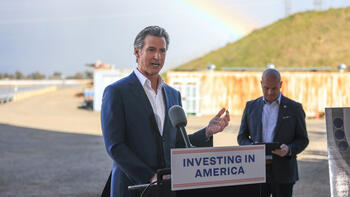
To the surprise of no one this side of the Sierras, Gavin Newsom is gearing up for a presidential run — a move he’s been rehearsing since succeeding Jerry Brown as California governor in 2019.
Newsom can often come across as a caricature of the opportunistic politician who is more focused on climbing to higher office than tackling California’s problems. By a margin of more than two to one, Californians say he cares more about his political ambitions than about delivering competent governance — a criticism echoed recently by San Jose’s Democratic mayor, Matt Mahan.
Still, it would be a mistake to write off the Governor. He’s quietly leapfrogged the far less fluent Kamala Harris in the polls. While Harris is still flirting with a run, few in the party’s upper ranks seem eager for it. Newsom, meanwhile, remains a darling of Silicon Valley’s oligarchs, many of them wary of Trump’s confrontations with China, and he’s even peeled away some Harris operatives.
As Democratic strategist Dave Gershwin notes, Newsom isn’t just ambitious — he’s methodical. “He is one of the hardest-working politicians I have seen,” Gershwin told me. “He will outwork any other Democratic candidate, and he knows how to adapt to win the propaganda war.”
Such flexibility shouldn’t surprise anyone who’s followed California politics. Newsom has a habit of repositioning himself. As San Francisco’s mayor, he courted business interests; as lieutenant governor, he made pilgrimages to Texas — where so many Californians have fled — praising its economic dynamism. After the Donald Trump’s presidential victory last year, he changed tack once more, extending a hand to conservatives like the late Charlie Kirk.
More recently, in response to his party’s fiercely anti-Trump mood, Newsom once again shifted gears, recasting himself as a self-styled leader of the “Resistance”. He has adopted some of Trump’s own rhetorical tactics, deploying sharp personal insults as if to borrow from the master provocateur himself. His effort to redraw congressional districts, effectively erasing what remains of the California GOP’s presence in Washington, appears likely to succeed, further cementing his standing among Democratic activists.
Newsom’s big challenge lies not in his tactics, but his record. The Governor has presided over California’s fall from economic preeminence. This is evidenced by poor GDP growth, the nation’s highest cost-of-living-adjusted poverty rate, a consistently underperforming public education system, a powerful out-migration trend, record homelessness, low homeownership and ever-increasing inequality.
In response to these harsh realities, Newsom likes to crow about California’s status as the world’s fourth largest economy, which largely reflects the success of a handful of tech companies. Unfortunately, however, the rest of the state is suffering. That is likely why he has fended off progressive proposals, such as a 32-hour work week, raising the state’s income tax, and adding new payroll taxes to pay for universal health care.
Read the rest of this piece at UnHerd.
Joel Kotkin is the author of The Coming of Neo-Feudalism: A Warning to the Global Middle Class. He is the Roger Hobbs Presidential Fellow in Urban Futures at Chapman University and and directs the Center for Demographics and Policy there. He is Senior Research Fellow at the Civitas Institute at the University of Texas in Austin. Learn more at joelkotkin.com and follow him on Twitter @joelkotkin.
Photo: Bureau of Reclamation, via Flickr under CC 2.0 License.












